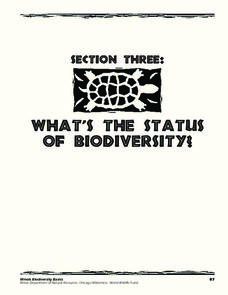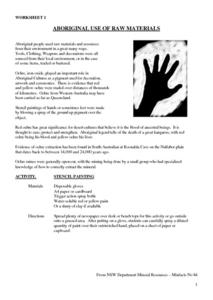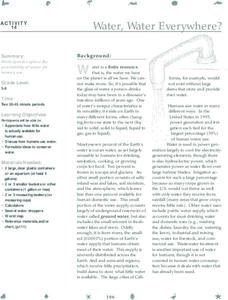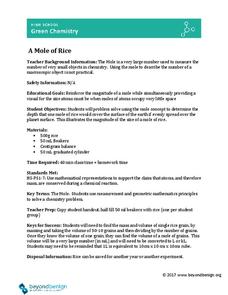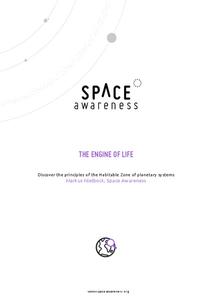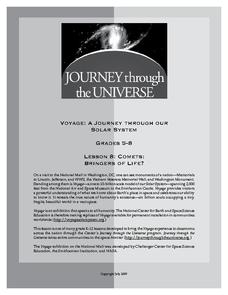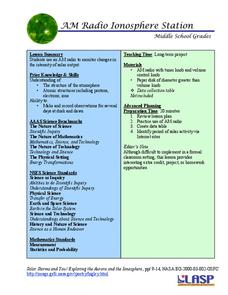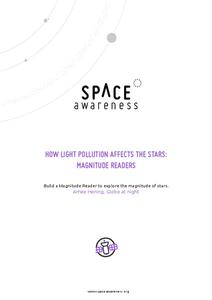Kenan Fellows
Sustainability: Learning for a Lifetime – The Importance of Water
Water is essential for life—and understanding the importance of clean drinking water is essential in understanding sustainability! Show your environmental science class the basics of water testing and treatment through a week-long...
Illinois Department of Natural Resources
Section Three: What's the Status of Biodiversity?
Biodiversity is essential for every habitat, but many species are at risk due to pollution and other factors. Explore several different species native to Illinois in a gallery walk with posters that learners have created after research...
NSW Department Mineral Resources
Aboriginal Use of Raw Materials
What's the difference between base metals and precious metals? Experimenting with natural metals is an interesting way for kids to learn about the world around them. Use a resource that contains over 30 pages of worksheets and...
American Chemical Society
Molecules Matter
Did you know that jumping spiders sometimes wear water droplets as hats? A seventh grade science lesson introduces the concept of what makes up water: tiny molecules that are attracted to each other. Starting with a chemistry discussion,...
Cornell University
Bacteria Take Over and Down
Bacteria outnumber all other forms of life on Earth. Scholars observe the growth of bacteria in petri dishes to understand their role in maintaining good health. Then, they observe the growth of bacteria after they introduce...
Science-Class.net
Rock Candy Crystals
Candy is one of my favorite words, and it's an even better word when it relates to science. Yes, candy science can happen when you grow rock candy crystals with your class. The entire process for growing these edible wonders of nature is...
Southwest Florida Water Management District
WaterWeb - Conservation and Water Supply
If 71% of our planet is covered with water, why do we need to bother conserving water? Find out with these activities designed for middle and high school environmental scientists. From reading articles to solving crossword puzzles, to...
US Geological Survey
Water, Water, Everywhere?
Less than one percent of the earth's water is available for human use. A hands-on activity models the phenomenon for young scientists. Beginning with a specific volume of water, learners remove water that correlates to the percent of...
Beyond Benign
Mole of Rice Activity
Learning about the mole using rice is pretty nice! Help your chemistry scholars visualize the concept of a mole of substance with an easy-to-perform lab. Partnered pupils find the mass of a single grain of rice and relate this...
Smithsonian Institution
Watching Crystals Grow
Amazing science can sometimes happen right before your eyes! The class gets cozy as they watch crystals grow. They use Epsom salts, rocks, and food coloring to create crystals. They'll observe the entire process, documenting every step...
PHET
Measuring the Interplanetary Magnetic Field
Scientists need to figure out how to measure interplanetary magnetic fields, but the magnetic field of the spacecraft is interfering with their readings. Scholars attempt to solve the problem that has perplexed NASA scientists for years.
Curated OER
Making Regolith
You may not be able to take a field trip to the moon, but that doesn't mean your class can't study moon rocks. Using graham crackers as the moon's bedrock and powdered donuts as micrometeorites, young scientists simulate the creation of...
US Environmental Protection Agency
Sea Level: On the Rise
With the global temperature on the rise, the effects of climate change are starting to be seen. However, many people have a difficult time conceptualizing the long-term effects, such as sea levels rising. Given an easy and effective...
Curated OER
Get a Leg Up
Traveling through space is an amazing experience, but it definitely takes a toll on the body. After reading an article and watching a brief video, learners perform an experiment that simulates the effects of zero gravity on the human body.
Space Awareness
Oceans as a Heat Reservoir
Oceans absorb half of the carbon dioxide and 80 percent of the greenhouse gases released into the atmosphere. Scholars learn how and why the oceans store heat more effectively than land and how they help mitigate global warming. Pupils...
Space Awareness
The Engine of Life
There is a specific zone, or distance from a star, that a planet must be in order to have water in a liquid form. The activity demonstrates how flux density depends on its distance from the source. A photovoltaic cell gets power to drive...
Curated OER
Greenhouse in a Bottle
Young atmospheric scientists create models of an atmosphere with and without clouds to determine the effect of cloud cover on Earth's temperatures, as well as figuring out whether dark or light surfaces absorb more energy. You may wish...
Curated OER
Rocks and Minerals
Take young geologists on an exploration of the collection of rocks and minerals that we call Earth with an upper-elementary science lesson. Through a series of class discussion and hands-on investigations, students learn about the three...
Space Awareness
Measure the Solar Diameter
Scientists could measure the diameter of the sun before they knew its distance. Scholars construct a simple mirror box to measure the diameter for themselves. They compare this measurement with the official size, listed in a textbook,...
Journey Through the Universe
Comets: Bringers of Life?
Young scientists investigate the elements found in our solar system and then construct a model of a comet. They apply their new knowledge to the formation of the solar system.
PHET
AM Radio Ionosphere Station
Tune in! Young scientists use an AM radio at home to monitor solar output. The long-term project would be ideal in a flipped classroom or as an out-of-class project.
Curated OER
Acid Rain
Create a simulation of acid rain in your classroom with lemon juice and bean plants to help kids study the effects of pollution on plants. In addition, learners will listen to a story and write responses based on guiding questions.
Science Matters
Peanut Energy
How do humans get energy since they aren't mechanical and can't photosynthesize? Learners explore this question by relating potential energy in food to human energy levels. Scholars measure the change in mass and a change in temperature...
Space Awareness
How Light Pollution Affects the Stars: Magnitude Readers
Did you know light can decrease visibility? Light pollution absolutely makes it more difficult to see stars. Scholars build a simple magnitude reader to determine the magnitude of stars. They use these data to estimate the impact of...



